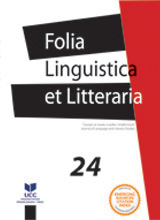“HE HALTS AT WATER’S EDGE”: LIFE, MOTION, AND IMMOBILITY IN SAMUEL BECKETT’S EMBERS
“HE HALTS AT WATER’S EDGE”: LIFE, MOTION, AND IMMOBILITY IN SAMUEL BECKETT’S EMBERS
Author(s): Andrew GoodspeedSubject(s): Comparative Study of Literature, Theory of Literature, British Literature
Published by: Filološki fakultet, Nikšić
Keywords: Samuel Beckett; Embers; motion; immobility; suicide;
Summary/Abstract: This paper considers the relation between motion and vitality in Samuel Beckett’s radio play Embers. The play, in which a largely motionless man contemplates his life, and engages in dialogues with a woman who may or may not be entirely in his head, has consistently been regarded as being primarily enacted within the head of Henry, the central figure. Yet this paper deduces that Henry’s late approach to the sea indicates a significant element of potential suicide in the sea, which is precedented by Henry’s father’s apparent suicide in the same sea beside which Henry sits.
Journal: Folia Linguistica et Litteraria
- Issue Year: 2018
- Issue No: 24
- Page Range: 11-22
- Page Count: 12
- Language: English

